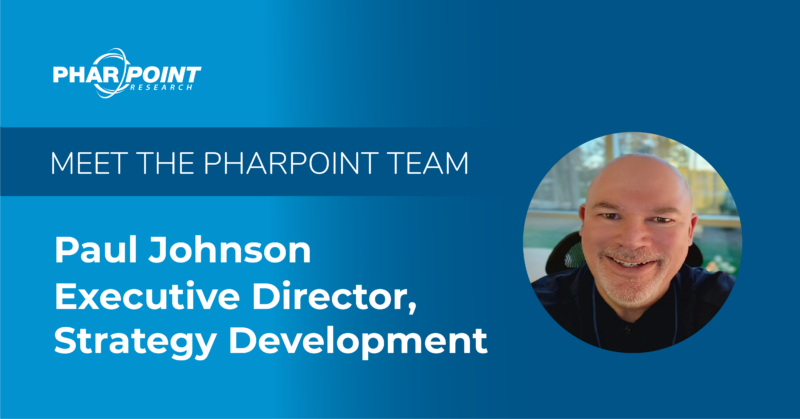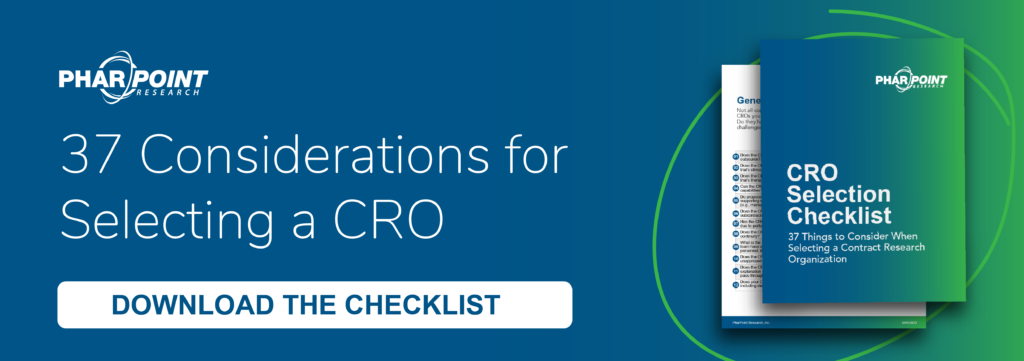
Paul Johnson, Executive Director of Strategy Development at PharPoint, has a 30+ year career in healthcare and a wealth of insight, best practices, and lessons learned to share.
In his role within strategy development and clinical consulting, Paul puts his experience to work for clients – providing guidance as innovative sponsors strategically plan, conduct, and execute clinical trials, all within budget and as efficiently as possible.
Over the span of his career, Paul’s had both patient-facing and more operations-focused CRO roles. In his early career, he worked within high-intensity critical care environments like trauma centers and neonatal intensive care units.
In the 20+ years to follow, that exposure to healthcare functions, patient populations, and different treatment modalities lent him a valuable perspective in the CRO space, where he’s built his career within clinical operations, operational management, and strategic consulting.
The most important piece of information he’s carried throughout his experience is fundamentally simple: “That research is people,” Paul says.
“The protocols, the thought exercises we do, the enrollment rates: these things all boil down to people who agree to be on a clinical trial. Sometimes they’re at the worst part of their life – you have to respect that, and take that into consideration.”
One of Paul’s earliest role within a CRO was working as a clinical research associate (CRA). At the time, he was based in the midwest and criss-crossing the U.S. to monitor sites on both coasts.
(“Everybody thought, well – you’re three hours from everywhere!” He says as he shares how he’d end up going from California to Boston to Florida, spending 15-16 days a month on site – a stark difference to the schedule of a CRA in 2024 who, with the right access to technology, can do much of their work remotely. “It was a different time.”)
After 15+ years with escalating responsibilities as a medical writer, monitor, a PM, and within operational management, Paul came to PharPoint as a director of clinical operations. His role transitioned into a stricter focus on clinical strategy right around the time the COVID-19 pandemic hit.
Paul and the PharPoint team – like so many in the clinical research space – were able to work on some unique studies tackling pandemic-related challenges, one of which was decentralization and the potential for including remote or virtual study aspects in a trial.
“Experiencing COVID through a research lens,” Paul shares, “and being at the point of the spear trying to operationalize studies during a pandemic, was fascinating and challenging.”
Paul sees the innovation and technology that came from that era of research continue to help make trials more patient-centric and compliant, even if no aspects are done in a “true” off-site, decentralized manner.
“Those methodologies are making clinical trials better: things like electronic medical packaging to improve drug compliance, or different applications for dosing reminders.”
As Sponsors seek out early conversations with clinical consultants and CROs, Paul offers his advice: find an experienced consultant you can trust – whether that’s at PharPoint or elsewhere – that can complement your own expertise as you dig deeper into the question of study feasibility.
“Intelligent clinical consulting is very valuable,” Paul says. “But if you’re getting clinical consulting that is subpar – from somebody who does not have the experience or the knowledge to be delivering the information they’re delivering – that’s detrimental to the quality of your work. It’s the origin of much of our rescue work at PharPoint.”
Paul’s advice for Sponsors who want to make sure their external clinical consultant is worth their salt? Ask about site start-up.
“An early red flag is talking to someone who doesn’t properly appreciate how much work is going to be needed in order to get a site up and running. Woefully underestimating the amount of time necessary and not providing enough resources.”
As 2024 unravels, Paul’s excited about innovation within the early clinical development space.
“I think there’s some really exciting things going on in the industry right now,” he shares. “New therapies, new modalities, and new ways to get to those modalities. I’m excited. It’s going to be really interesting to see how they develop over the next few years.”
RELATED RESOURCES




